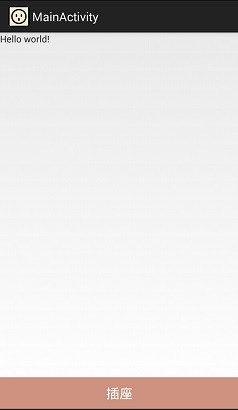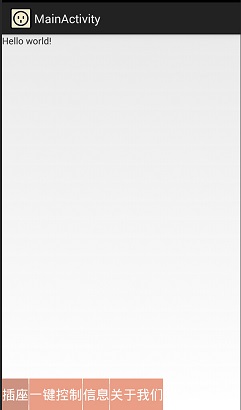Android 中 TabHost 的 TabWidget 显示问题
当布局文件是这样的时候:
<TabHost xmlns:android="http://schemas.android.com/apk/res/android"
xmlns:tools="http://schemas.android.com/tools"
android:id="@android:id/tabhost"
android:layout_width="fill_parent"
android:layout_height="fill_parent"
tools:context="com.smtsokt.activity.MainActivity" >
<LinearLayout
android:layout_width="fill_parent"
android:layout_height="fill_parent"
android:orientation="vertical" >
<FrameLayout
android:id="@android:id/tabcontent"
android:layout_width="fill_parent"
android:layout_height="0dp"
android:layout_weight="11" >
</FrameLayout>
<TabWidget
android:id="@android:id/tabs"
android:layout_width="match_parent"
android:layout_height="0dp"
android:layout_weight="1"
android:orientation="horizontal" >
</TabWidget>
</LinearLayout>
</TabHost>
TabWidget的宽度改为 wrap_content 时:
<TabWidget
android:id="@android:id/tabs"
android:layout_width="wrap_content"
android:layout_height="0dp"
android:layout_weight="1"
android:orientation="horizontal" >
</TabWidget>
我怎样才能让这几个选项卡平铺在下方呢?
终于找到大神相助
private void setWeight(TabWidget tabWidget)
{
WindowManager windowManager = getWindowManager();
Display windowDisplay = windowManager.getDefaultDisplay();
int windowWidth = windowDisplay.getWidth();
int tabWidth = windowWidth / 4; // 宽度比为:3:4:4:6:9
tabWidget.getChildAt(0).setLayoutParams(new LinearLayout.LayoutParams(tabWidth, LayoutParams.FILL_PARENT));
tabWidget.getChildAt(1).setLayoutParams(new LinearLayout.LayoutParams(tabWidth, LayoutParams.FILL_PARENT));
tabWidget.getChildAt(2).setLayoutParams(new LinearLayout.LayoutParams(tabWidth, LayoutParams.FILL_PARENT));
tabWidget.getChildAt(3).setLayoutParams(new LinearLayout.LayoutParams(tabWidth, LayoutParams.FILL_PARENT));
}
这样是ok的:
<?xml version="1.0" encoding="utf-8"?>
android:id="@android:id/tabhost"
android:layout_width="match_parent"
android:layout_height="match_parent" >
<LinearLayout
android:layout_width="match_parent"
android:layout_height="match_parent"
android:orientation="vertical" >
<FrameLayout
android:id="@android:id/tabcontent"
android:layout_width="match_parent"
android:layout_height="match_parent" >
</FrameLayout>
<TabWidget
android:id="@android:id/tabs"
android:layout_width="match_parent"
android:layout_height="wrap_content"
android:gravity="right|center_vertical" />
</LinearLayout>
这是我很久以前联系tab的一个demo,你对比看看
主布局文件:
<?xml version="1.0" encoding="utf-8"?>
android:layout_width="match_parent"
android:layout_height="match_parent"
android:orientation="vertical">
<!--
TabHost的id为"@+id/tabhost"
-->
android:id="@+id/tabhost"
android:layout_width="match_parent"
android:layout_height="match_parent">
<LinearLayout
android:layout_width="match_parent"
android:layout_height="match_parent"
android:orientation="vertical">
<TabWidget
android:id="@android:id/tabs"
android:layout_width="match_parent"
android:layout_height="wrap_content"
android:layout_marginTop="1dp">
</TabWidget>
<FrameLayout
android:id="@android:id/tabcontent"
android:layout_width="match_parent"
android:layout_height="match_parent">
<LinearLayout
android:id="@+id/tab1"
android:layout_width="match_parent"
android:layout_height="match_parent">
<TextView
android:id="@+id/tab1_txt"
android:layout_width="match_parent"
android:layout_height="match_parent"
android:text="the content of tab1"
android:textSize="20sp"/>
</LinearLayout>
<LinearLayout
android:id="@+id/tab2"
android:layout_width="match_parent"
android:layout_height="match_parent">
<TextView
android:id="@+id/tab2_txt"
android:layout_width="match_parent"
android:layout_height="match_parent"
android:text="the content of tab2"
android:textSize="20sp"/>
</LinearLayout>
<LinearLayout
android:id="@+id/tab3"
android:layout_width="match_parent"
android:layout_height="match_parent">
<TextView
android:id="@+id/tab3_txt"
android:layout_width="match_parent"
android:layout_height="match_parent"
android:text="the content of tab3"
android:textSize="20sp"/>
</LinearLayout>
</FrameLayout>
</LinearLayout>
</TabHost>
主Activity文件:
protected void onCreate(Bundle savedInstanceState) {
super.onCreate(savedInstanceState);
setContentView(R.layout.tabhost1);
TabHost tabHost = (TabHost) MyTab1.this.findViewById(R.id.tabhost);
tabHost.setup();
TabHost.TabSpec tabSpec01 = tabHost.newTabSpec("tab1");
tabSpec01.setIndicator("firsttab", MyTab1.this.getResources().getDrawable(R.drawable.ic_launcher));
tabSpec01.setContent(R.id.tab1);
TabHost.TabSpec tabSpec02 = tabHost.newTabSpec("tab2");
tabSpec02.setIndicator("secondtab", MyTab1.this.getResources().getDrawable(R.drawable.ic_launcher));
tabSpec02.setContent(R.id.tab2);
TabHost.TabSpec tabSpec03 = tabHost.newTabSpec("tab3");
tabSpec03.setIndicator("thirdtab", MyTab1.this.getResources().getDrawable(R.drawable.ic_launcher));
tabSpec03.setContent(R.id.tab3);
tabHost.addTab(tabSpec01);
tabHost.addTab(tabSpec02);
tabHost.addTab(tabSpec03);
}
我觉得你是水平放置按钮的,应该把TabWidget 的宽高改成 android:layout_width="0dp" android:layout_height="wrap_content",
不知道是不是这个问题,可以试试
Tab过时了,看看我的博客:
http://blog.csdn.net/logicteamleader/article/details/45487263

